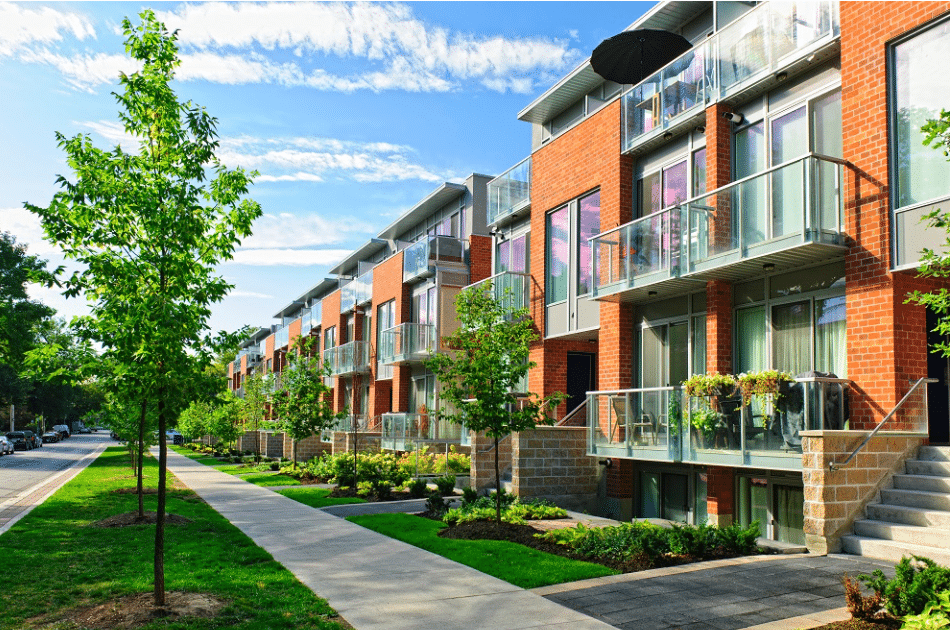We’re less than two months into 2024 but already, we’re seeing some interesting trends in the Canadian rental housing market. Today, we’ll explore what these trends might mean for the rest of the year, and we’ll also take a look back at 2023 rental housing market trends to see how things have changed.
2023 Rental Housing Market Review
To begin, let’s take a look back at the rental housing market in 2023. Overall, we would say it was a positive year for Canadian landlords as demand for rental properties remained strong, and vacancy rates continued to decrease in most places. Rent prices also steadily increased in major cities like Toronto, Vancouver, and Montreal.
Fueling this transformative surge in its rental housing market, characterized by remarkable increases in average rental prices across the nation, were several factors.
Some of these include:
- Economic conditions
- Demographic trends
- Shifts in housing preferences
What was the average asking rent for residential properties in Canada in 2023?
The average asking rent for all residential properties reached a historic high of $2,178 in December 2023. This marks an impressive 8.6% increase from the previous year, which was also a record-setter of its own at $2,005. This surge was part of a broader trend, with rental prices experiencing an annualized growth rate of 22% over the past two years. This undoubtedly reflects significant changes in the Canadian housing and rental landscape.
This increase in demand also led to an increase in competition among renters, which drove up asking rent prices even further.
Which area saw the most growth?
Traditional purpose-built rental apartments saw the most substantial growth—they had an annual increase of 12.8%. This points to a serious preference for this type of housing among renters. However, condominium and home rentals also experienced notable growth rates of 6.9% and 5.9%, respectively, underscoring the widespread nature of the rental market’s transformation.
Quebec emerged as a standout province in 2023, witnessing apartment rent growth that surpassed the national average. Much of this could be due to the increased employment opportunities for 15-24-year-olds. Because they were on the hunt for the least expensive rental properties possible, renters quickly scooped up these options. Then, the vacancy rate was left at just 1.1%.
Statistics from the 2023 Canadian Rental Housing Market
Here are some notable stats to take away from the 2023 rental housing market.
- The vacancy rate in Canada was 1.5% for the purpose-built rental market
- With an 8% increase, the average two-bedroom rental price was $1359 in the purpose-built rental market
- In the condominium/apartment market, the average vacancy rate was 0.9%
- The average two-bedroom rental cost was $2049
- Vacancy rates declined in all but two of Canada’s larger rental markets (Ottawa and Vancouver), where they remained unchanged
- At 8%, rent growth exceeded both inflation (4.7%) and wage growth (5%), which signals a lack of affordability for renters
2024 Rental Housing Market Outlook
With 2023 behind us, what can we expect for the 2024 rental housing market? One of the overarching trends many experts predict is that things will stabilize somewhat. Rent growth is expected to converge toward its five-year average of approximately 5%. In large cities like Toronto and Vancouver, rent growth may even decline slightly due to increased rental supply.
Two primary factors are helping people be more optimistic about the 2024 market: more apartment buildings being completed and an increase in tenant turnover. Each of these should serve to reduce rent growth.
Interest rates and inflation are still likely to make homeownership more challenging than it has been in the past. That being said, some predict a decline in interest rates and possibly even inflation in 2024. This could mean more people are able to purchase homes, creating more affordable opportunities for renters.
Canadian Rental Housing Market: FAQs
Now that we’ve covered the basics of the 2024 rental housing market outlook let’s address some frequently asked questions about the Canadian rental market in general.
How does Canada’s rental market compare to other countries?
Compared to other G7 countries, rental rates have risen much faster in Canada. Since 2006, however, Canada’s price-to-rent ratio has increased at a similar rate to Great Britain and France, which follow Canada in second and third place on the house price index for G7 countries.
What is a healthy rental vacancy rate?
Most experts would say a reasonably healthy rental vacancy rate falls somewhere between 5-10%. If it is any higher, it becomes too challenging for landlords to fill units, while if it is any lower, renters will struggle to find suitable housing options.
What is a low vacancy rate?
This metric refers to the percentage of unoccupied rental units in a given geographical area. A low vacancy rate is typically considered below 3%, which puts intense pressure on renters and increases competition for available units. Considering Canada’s average vacancy rate below 1.5%, you can see why the housing crisis is so pressing.
Learn More About Rental Deposits Now
If you’re eager to enter the rental housing market, consider Rental Deposits Now. We offer innovative property management solutions, including getting rid of security deposits. Instead, we’re helping empower tenants by removing financial barriers to entry while also helping property managers boost their ROI and asset performance.
Don’t wait! Head here to learn more. Or, check out our FAQ page for quick answers to your burning questions!

